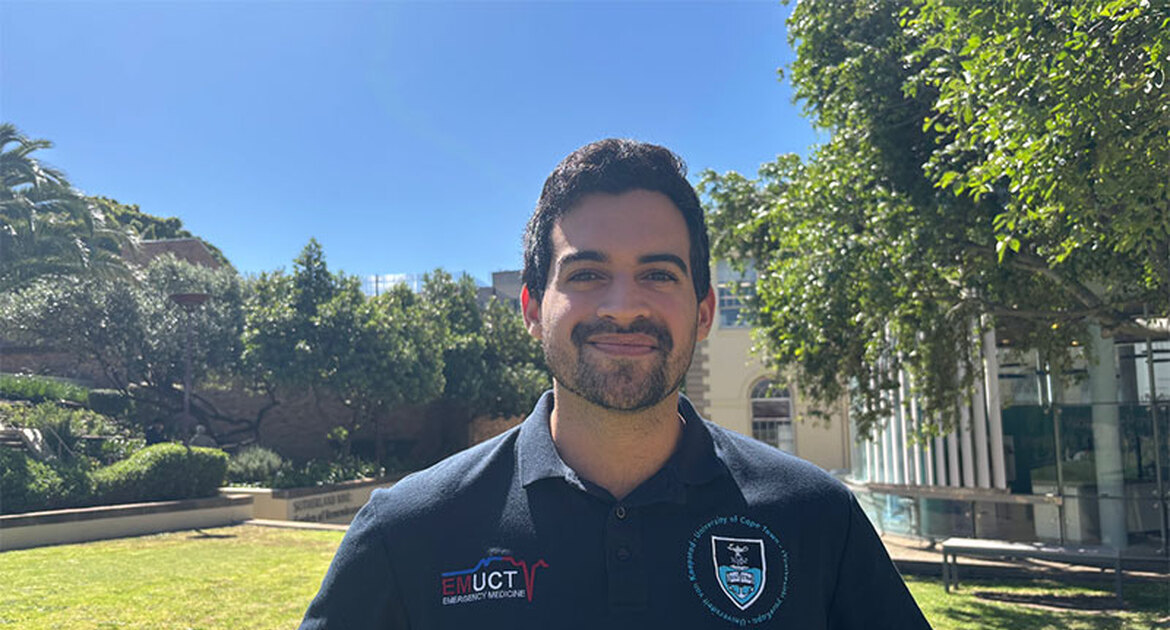Women’s Month: Oluchi Mbamalu working towards better patient communication
23 August 2024 | Story Natalie Simon. Photo Supplied. Read time 9 min.
Dr Oluchi Mbamalu, a pharmacist and researcher in the Division of Global Surgery, is passionate about finding ways to improve patient and healthcare worker engagement for better post-surgical outcomes in Africa.
Dr Oluchi Mbamalu grew up in the Nigerian town of Nsukka. She studied pharmacy in Nigeria and worked briefly as a pharmacist in her home country. But she was interested in research and wanted to study for her master’s as soon as possible. She wanted to challenge herself by stepping out of her comfort zone to see how she would cope in a new setting. She applied for a master’s degree at the University of the Western Cape (UWC) and was accepted. And so, in 2007 she opened the next chapter of her life.
Dr Mbamalu completed her master’s and PhD degrees in Pharmaceutical Sciences at UWC, graduating in 2015. Her postgraduate studies involved laboratory work, and she loved the environment, working with research materials and equipment. She also assisted with supervising postgraduate students and training undergraduate students.
“I have always been inquisitive, always asking questions,” said Mbamalu. “I tried to incorporate this spirit of curiosity into my teaching and loved the practical component of the lectures which brought elements of research into the coursework.”
But after completing her PhD, she decided to step outside of academia for a while, to complete the process of registering with the South African Pharmacy Council (SAPC) so she could work as a pharmacist in the country.
Her goal in doing this, however, was to strengthen her research in the long term.
“I was teaching students in the classroom and conducting research in pharmaceutical sciences but could not really venture into pharmaceutical service environments as I was not yet registered with the SAPC,” she said. “And this felt like it was really limiting the kind of research I could do, and the insights I could provide as one in the pharmacy field.”
Community work sowing the seeds for later research
To qualify as a practicing pharmacist in South Africa it is necessary to complete both an internship and a stint in community service. Mbamalu did her internship at Salmarz Pharmacy in Pinelands and community service at a Clicks Pharmacy at Melkbosstrand. Without her realising it, it was during this period that the seeds were planted for Mbamalu’s later research focus. She really began to pay attention to how healthcare workers and patients interact.
She noticed how common it was that patients would come from seeing a doctor, holding a script or sometimes even holding a bag of medication, and ask the pharmacist: “what is this?”
“While doctors would generally discuss the patient’s condition and the treatment being provided – with the patient – it appeared this information was not being assimilated by some patients,” said Mbamalu. “And this is a big problem because patients need to understand how to take their medication in order to recover properly.”
In this pharmacist to patient role, Mbamalu was grateful for her research and lecturing experience which allowed her to really break down the concepts to the patients in ways that they could understand, but she recognised a bigger problem that needed to be addressed.
“As a clinician and researcher, I can better help patients one-on-one, but also conduct research to try and understand and help address the bigger systemic problems.”
“This kind of experience is exactly why I wanted to juggle clinical work and research,” said Mbamalu. “As a clinician and researcher, I can better help patients one-on-one, but also conduct research to try and understand and help address the bigger systemic problems.”
Research for improved patient communication
After completing her community service year, Mbamalu worked as a locum pharmacist in different sectors. Her love for research saw her return to a research post in the Division of Infectious Diseases and HIV Medicine as a Research Pharmacist, working on a project to optimise antimicrobial use in the surgical pathway.
This research was conducted at Groote Schuur’s in-patient department and involved surgical patients and the healthcare workers who cared for them while in hospital. This research project focused in part on patients but also on other aspects related to antimicrobial use, communication, and decision making by healthcare workers.
During the project Mbamalu noticed the low levels of engagement by patients around the surgery and recovery, especially in relation to infection care. This reminded her of her experience as a pharmacist in which patients sometimes struggled to understand their follow-up care.
She discussed this subject with her supervisor and followed up with an application to the National Research Foundation (NRF) to investigate this further. The proposal was approved, and she expanded this research looking at patient engagement to Groote Schuur’s out-patient department, focusing on engagement in infection care among patients in the cardiovascular and thoracic, acute care, and colo-rectal specialties.
This research involved a team which included members of the public and students. The team gathered their information through conducting surveys, observations and interviews with specific groups of patients and their healthcare practitioners at Groote Schuur.
“We need to make the language that we use when speaking to patients more relatable. And this is not something I want to do for patients, it is something I need to do with patients.”
Going forward
As a result of this work on patient engagement for better surgical care, Mbamalu moved to the Division of Global Surgery as a Senior Lecturer, where her work is very relevant in the Division’s mission to improve health outcomes of surgical interventions in Africa. She also convenes the Global Surgery PhD programme while independently leading her own research projects.
Mbamalu said the research revealed useful information on how patients prefer to be communicated with. What they found is that a multi-pronged strategy was necessary; some patients want the information before they leave the hospital, others want to be told at discharge. Some want videos on their phone and others want paper handouts with images and step-by-step directions.
Going forward, she plans to try incorporating these findings into policy and practice for better post-surgical care for patients in South Africa. She also keeps up to date with her competencies and practice as a pharmacist to ensure she remains in touch with patients and can draw from the insights of clinical work to inform her research.
“I now have something of a bee in my bonnet around patient communication,” said Mbamalu with a laugh. “We need to make the language that we use when speaking to patients more relatable. And this is not something I want to do for patients, it is something I need to do with patients.”
 This work is licensed under a Creative Commons Attribution-NoDerivatives 4.0 International License.
This work is licensed under a Creative Commons Attribution-NoDerivatives 4.0 International License.
Please view the republishing articles page for more information.
Faculty of Health Sciences News
























